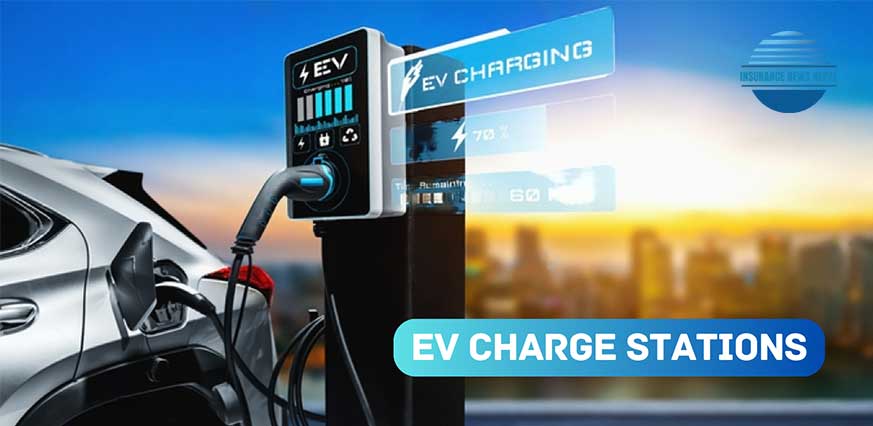 Nepal has come a long way toward implementing sustainable and eco-friendly transportation systems in the previous several years. One of the most amazing developments in this area is the rapid national distribution of electric vehicle (EV) charging stations. By creating a solid electric vehicle (EV) network, Nepal is undoubtedly making a contribution to the worldwide drive toward a greener future.
Nepal has come a long way toward implementing sustainable and eco-friendly transportation systems in the previous several years. One of the most amazing developments in this area is the rapid national distribution of electric vehicle (EV) charging stations. By creating a solid electric vehicle (EV) network, Nepal is undoubtedly making a contribution to the worldwide drive toward a greener future.
The utilization of electric vehicles is still relatively new in Nepal. 1% of the population in Nepal is currently thought to utilize an electric scooter, despite the fact that the number of electric vehicles in the country is not known with confidence. This number is expected to increase significantly over the next few years as the government has set a target of making Nepal a fully electric vehicle nation by the end of the current year.
Types of Electric Vehicle(EV) Charger
Nepal has seen a significant rise in the number of EV charging stations over the past several years. These stations fall into one of three categories:
- Slow Charger
- Fast Charger
- Rapid Charger
| Type | Charging Watt | Charging Time | Battery % |
|---|---|---|---|
| Slow Chargers | 3kw | 12 hr | 0-100% |
| Slow Chargers | 7kw | 6-8 hr | 0-100% |
| Fast Chargers | 22kw | 3 hr | 0-100% |
| Rapid Charger | 50kw | 40 min | 0-80% |
| Ultra-Rapid Charger | 350kw | 20 min | 0-80% |
Slow Chargers
You may often find these chargers in homes and offices. Although they have a reduced charging capacity, they are practical for charging at night so that the battery is fully charged in the morning.
- Home Electric Socket(3kW): Typically it takes 12 hours to fully recharge a battery from zero.
- Home EV Charger(7kW): Typically it takes 6-8 hours to fully recharge a battery from zero.
Fast Chargers
Fast chargers offer substantially quicker charging speeds than slow chargers and are frequently found in business areas, shopping centers, and motorways. They are perfect for an afternoon fast top-up.
- Fast Charger(22kW): Typically it takes 3 hours to fully recharge a battery from zero.
Rapid Chargers
Rapid chargers are judiciously positioned along key thoroughfares. They provide ultra-fast charging, enabling EV owners to swiftly refuel their cars while on lengthy trips.
- Rapid Charger(50kW): Typically it takes 40 mins to charge 80% of the battery and after that to charge the remaining 20%, the charging speed is slowed down in order to protect the battery life.
- Ultra-Rapid Charger(350kW): Typically it takes 20 mins to charge 80% of the battery and after that to charge the remaining 20%, the charging speed is slowed down in order to protect the battery life.
List of Electric Car Charger Locations in Nepal
| Charging Point | Location | Contact Number |
|---|---|---|
| Thapathali EV showroom | Thapathali | 01-5911553/5911554/5911556 |
| Orchid Moto Corp | Birgunj | 091-523714/524492 |
| LI Quick Service | Tinkune | 01-4111891/4111892 |
| LI Service | Kupondole | 01-5420037/5450380/5550380 |
| LI Service | Dhapasi | 01-4355430/4355431 |
| LI Service | Bhaktapur | 01-5970226/6635266 |
| Labim Mall | Pulchowk, Lalitpur | 01-5529924 |
| New Shiv Service | Sinamangal | 01-4474511/4474512/4474513 |
| Hyundai Sales | Naxal | 01-5911556/5911457/5911558 |
| Laxmi Bank Head Office | Kathmandu-Hattisar | 01-4544684 |
| Hyundai Sales | Thapathali | 01-5911553/5911554/5911556 |
| Hotel Devotee | Dhangadhi | 091-521618 |
| Hotel Pauwa | Bhalubhang | 071-570305 |
| Pinnacle Service | Basanta Chowk, Bharatpur | 056-526276 |
| Royal Century Hotel | Bharatpur | 056-525865 |
| Barahi Jungle Lodge | Bharatpur, Meghauli West | 9851331247 |
| Siddhartha Resort | Chisapani | 091-414000 |
| Dinesh 4 Wheels | Dhangadi | 091-523714/524492 |
| Siddhartha Hotel | Nepalgunj | 081-551200 |
| Him Intercontinental | Nepalgunj | 081-550427/081-550428/081-550429 |
| New Rider Autoworld | Dang | 082-562602 |
| Siddhi Vinayak Service | Butwal | 071-415275 |
| Hotel Da Flamingo | Butwal | 071-420152 |
| Jagat Motor | Bhairahawa | 071-575428/071-575429 |
| Bodhi Red Sun | Bhairahawa | 071-525957 |
| KC's Restaurant & Home | Sauraha | 985-5015309 |
| Hotel Nepalirika | Biratchowk | 021-545212 |
| Hotel Kingsbury | Birtamode | 023-509700 |
| Akchyat Resort | Mulkot | 9851045480 |
| Hotel Vishwa | Birgunj | 051-591055 |
| Orchids Moto Corp | Birgunj | 091-523714/524492 |
| Hetauda Wheels | Hetauda | 057-520200 |
| Avocado & Orchids Resort | Hetauda | 057-520235 |
| Royal Auto World | Biratnagar | 021-460609 |
| Pathivara Auto Link | Itahari | 025-587502 |
| Alliance Motors | Birtamode | 023-541495 |
| Barahi Service Center | Pokhara | 061-524336 |
| Bindiya Service Center | Pokhara | 061-530436 |
| Water Front Resort | Pokhara | 061-420004 |
| Hotel Barahi | Pokhara | 061-460617 |
| Kurintar Retreat | Kurintar-Darechowk | 9851340153 |
| Hotel Soaltee Westend | Itahari-Koshi Highway | 025-587502 |
| Hotel Nepalirika | Damak- E-W Highway | 9717216222 |
You may also like:
- Navigating Electric Car Insurance in Nepal: Tips and Coverage Insights
- Smart Investing: Choosing the Right Shares to Buy in Nepal
- Vehicle Insurance
Why Fast EV Charging Stations are important?
In Nepal, EV charging stations are essential for advancing public health, enhancing energy security, fostering economic growth, and so on. The importance of EV charging stations is listed below:
- Air Quality Improvement: EV charging stations promote zero-emission electric cars, reducing air pollution and addressing health issues associated with poor air quality in metropolitan settings.
- Energy Security: As Nepal moves toward electric transportation, its reliance on imported fossil fuels decreases, boosting energy security and stability.
- Economic Growth: By generating jobs and promoting entrepreneurship, the EV charging sector promotes economic growth and aids in the advancement of the nation’s economy.
- Sustainable Tourism: Charging stations help promote sustainable tourism by accommodating eco-aware visitors who drive electric cars, supporting Nepal’s commitment to environmental protection.
- Global Environmental Commitments: Nepal has shown its commitment to tackling climate change by adopting EVs and clean charging that are in line with international accords like the Paris Agreement.
Is the future of Electric Vehicles(EVs) good in Nepal?
Electric vehicles (EVs) have a bright future in Nepal If charging stations are easily available in different locations. EVs are becoming a feasible choice as Nepal struggles with air pollution problems and looks for sustainable transportation options. As a result of its abundance of water resources, Nepal is known to have a great potential for electricity production. We may expect more Nepali customers to transition to electric mobility since the Nepali government is diligently working to enhance the number of charging stations.
The advantages are obvious: lower emissions, lower costs, and less reliance on imported fossil fuels. We can imagine a day when EVs are often seen on Nepal’s roadways if the charger network keeps expanding, even into remote regions, and if renewable energy integration increases. However, ongoing government backing and increased public knowledge of the benefits of electric cars in terms of the environment and the economy will also be necessary for EVs to succeed in Nepal.
What are the benefits of EV Charge Stations?
- Enhanced Convenience: With more EV charging stations available, it is easier for owners of electric vehicles to find a location where the battery of their vehicle may be charged.
- Time Efficiency: Charging stations provide quicker charging periods than home charging, which occasionally requires an 8-hour level 2 charger. In less than 30 minutes, certain rapid chargers may restore up to 80% of the battery’s capacity.
- Fuel Cost Savings: While it is well known that electric vehicles (EVs) are fuel-efficient, the increased accessibility of charging stations increases these savings and gives EV owners an even more affordable mode of transportation.
FAQs:
How long does an electric car battery last?
How do I charge my EV at home?
What is the app for EV charging stations in Nepal?
How to open an EV charging station in Nepal?
What is electric vehicle charging station?
Conclusion
In Nepal, the use of EV charging stations goes well beyond simple practicality; it is a revolutionary force guiding the country toward a more sustainable and affluent future. EV charging stations are playing a crucial role in determining Nepal’s course toward sustainability by reducing air pollution, enhancing energy security, fostering economic growth, and adhering to international environmental commitments. These charging stations serve as more than simply electric car power outlets; they also serve as an inspiration for a Nepal that is healthier, more sustainable, and flexible.

